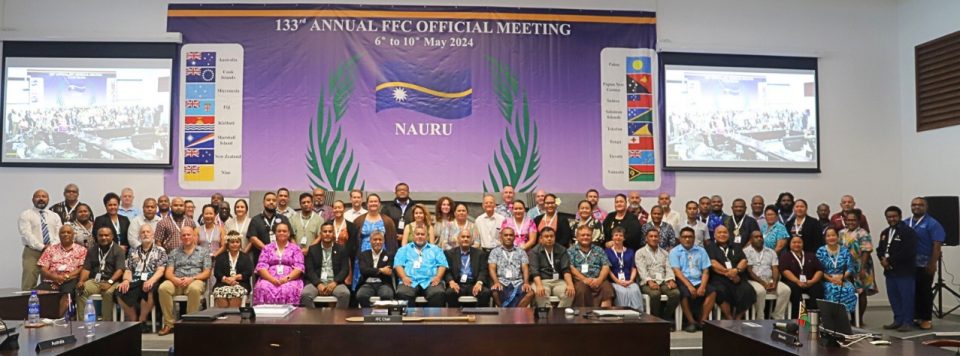The FFC Officials, made up of senior fisheries officials from the 17 Members of FFA, agree on FFA’s priorities, annual reporting and budgeting. PICTURE PROVIDED
The Forum Fisheries Committee (FFC) Officials have concluded the 133rd FFC Officials Annual Meeting (FFC133) held in Nauru from 6 – 10 May.
The meeting brought together fisheries officials from the 17 Members of the Pacific Islands Forum Fisheries Agency (FFA), as well as observers from regional and international organizations, to deliberate and agree on ways forward for Pacific tuna fisheries.
The weeklong meeting involved the endorsements of strategic and implementation plans by FFA, proposal of new initiatives, as well as resolving the challenges Members face in their fisheries work.
Among other key endorsements made by the Committee include the Information Management Strategy, designed to strengthen the data systems and improve regional information coordination, and the Gender Equality and Social Inclusion (GESI) Strategy.
These are part of FFA’s ongoing efforts to integrate inclusive principles into fisheries management and the continued improvement of social benefits from Members’ tuna fisheries.
Endorsement of Implementation Plan for Climate Change Strategy
This also included the endorsement of the Implementation Plan for the FFA’s Climate Change Strategy – a comprehensive approach to integrating climate resilience into fisheries management.
This endorsement will allow FFA to carry out action plans for climate adaptation, resilience and capacity building, underlining the urgency to address climate-induced threats for Pacific fisheries.
East New Britain initiative
The Committee deliberated on the progress of the East New Britain Initiative (ENBi), an initiative led by the Papua New Guinea Government through the PNG National Fisheries Authority in September 2023, with objectives to enhance the economic benefits of tuna fisheries by developing regional processing hubs and other value-addition initiatives.
The formation of an ENBi Working Group (EWG) was made known to the Committee, and a working plan for the EWG was endorsed.
Regional Monitoring, Control, and Surveillance (RMCS) Strategy
The Committee discussed the FFA’s ongoing effort to fight Illegal, Unreported and Unregulated (IUU) fishing and endorsed a new monitoring, control and surveillance strategy – the Regional Monitoring, Control, and Surveillance Strategy (RMCSS) for 2024-2029.
This RMCSS is aimed at optimising compliance with fisheries management frameworks, and it will be further considered by the FFC Ministerial Meeting in July.
Labour Standards on Fishing Vessels
A significant focus at the FFC was placed on improving labour standards on fishing vessels.
The Committee supported organizing a regional training workshop to further develop the WCPFC’s (Western and Central Pacific Fisheries Commission) regulations on Labour Standards for FFA Members.
This effort is part of the broader goal to assist Members to implement at the national level the Harmonized Minimum Terms and Conditions (HMTCs), before the WCPFC’s 21st Regular Session meeting set for December this year.
Other endorsements and outcomes
Significant progress was made with the endorsement of a revised work plan for the Regional Longline Strategy (RLS). The RLS focuses on enhancing the management of longline fisheries through improved data collection and monitoring.
The Committee also agreed to prioritize the development of zone-based limits for South Pacific Albacore, aiming to ensure sustainable management and economic benefits from this fishery.
The next annual FFC Officials meeting is set to be hosted by Niue in May 2025.
The FFC Officials will return to Nauru in July for pre-meetings ahead of the FFC Ministers 23rd Annual Meeting.


